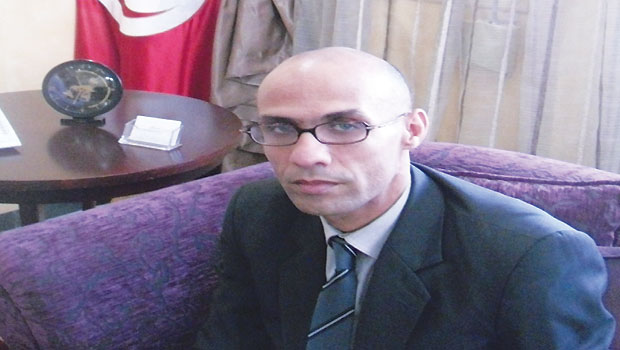
File photo of Tunisian employment minister Naoufel Jammali. (Asharq Al-Awsat)
Tunis, Asharq Al-Awsat—Tunisian minister of vocational training and employment Naoufel Jammali has revealed that the rate of unemployment in his country has decreased from 18.9 percent to 16.5 percent, adding that Tunisia had managed to get 200,000 citizens back to work over the past two years.
Speaking exclusively to Asharq Al-Awsat, the Tunisian employment minister said: “These numbers may appear to be insignificant compared to the total number of unemployed, but this is very important considering the exceptional political circumstances.”
He added: “There is great hope in improved social and economic conditions to properly address the issues of growth and development.”
Jammali also claimed that it would be possible “to reduce the unemployment rate to between 14 or 15 percent if the country is able to overcome the stage of democratic transition and achieve political security and stability in peace.”
The Tunisian employment minister also revealed that the government plans to employ 90,000 people this year and has already created 25,000 jobs in addition to the jobs provided by the public sector.
He emphasized, “The luck of future generations of Tunisian youth will improve in the coming years due to the changing demographic structure,” adding that the Tunisian economy has been built on a system of serving European countries, which is a system that grants those without college degrees more chance of finding employment.
According to Jammali, the current government, in the absence of political stability and security in Tunisia, is seeking to “deliver the ship to safety.”
As for the multiple accusations directed at the Ministry of Employment and Vocational Training and the pressures brought on by hundreds of thousands of unemployed—especially in the areas that fueled the revolution—Jammali emphasized: “The ministry is not the only one that is playing a decisive role on this issue.”
He pointed out that other factors directly affect unemployment, including factors linked to politics, the investment climate, security and political stability.
Jammali also referred to the implementation of urgent operational strategies based on positively distinguishing Tunisian areas known for high unemployment rates. These areas are predominately located in western Tunisia and saw strong protests during the revolution, including Sidi Bouzid, Kasserine, Siliana, Gafsa, El-Kef, Jendouba and Beja.
Jammali also mentioned a program aimed at employing 65,000 Tunisian youth in public projects. The state will enable these youths to overcome the problem of bank guarantees that haunt young people looking to invest by providing 10 percent of overall investment.
“The allocation of these funds will be depend on the unemployment rate in each area … and the largest share will be reserved for the poorest areas in the west,” he said.
With regards to the Libyan labor market and concerns about accommodating thousands of unemployed Tunisians in Libya within reconstruction plans, Jammali told Asharq Al-Awsat: “The current estimates indicate that there are no more than 20,000 Tunisian workers in Libya, which represents less than 20 percent of the pre-Arab Spring figure.”
He attributed the decline in employment to the lack of political stability in Libya and the security problems that still exist there. He also pointed to the pivotal role of the Tunisian state in easing communication with Libya in order for everything to proceed legally.
As for claims regarding an imbalance in the Tunisian labor market and the transfer of workers to Libya, particularly within the construction field, the minister said: “Some youth refuse to work within arduous professions and many youngsters don’t have faith in vocational training. This brings down demand for certain sectors within the labor market.”
He added that many Tunisian families maintain a traditional attitude towards vocational training and consider it a less than perfect solution, rather than the optimal one, for entering the labor market.
Jammali added that an increase approved by the ministry regarding financial grants assigned to students for vocational training from TND 20 per month to TND 60 (USD 13 to USD 39) will help in stimulating young people to join the vocational training sector.

Trackbacks/Pingbacks